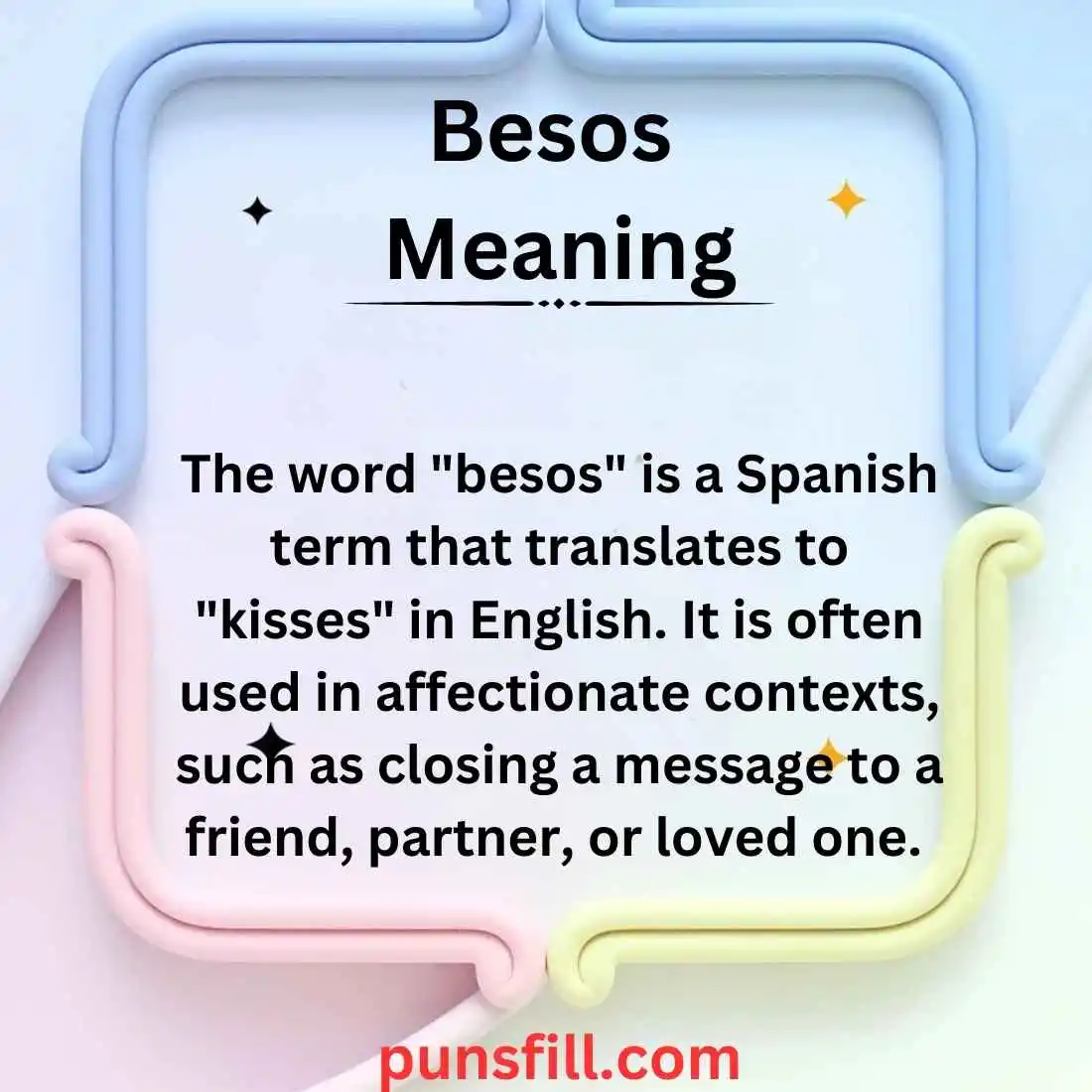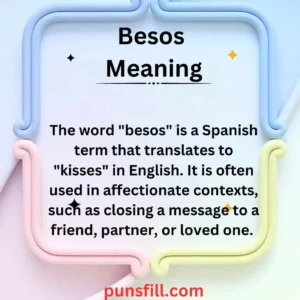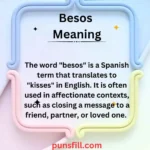Last Updated on February 22, 2025 by Ethan Richards
The word “besos” is a Spanish term that translates to “kisses” in English. It is often used in affectionate contexts, such as closing a message to a friend, partner, or loved one.
However, depending on the relationship and cultural norms, there are various ways to express similar sentiments in a polite, professional, or casual manner.
This article explores different alternatives to “besos,” helping you navigate when and how to use them based on tone, formality, and context.
Understanding “Besos” in Context
In Spanish-speaking cultures, “besos” is a common way to sign off messages with warmth. It conveys affection and is often used in informal settings, such as:
- Texting a close friend: “¡Hasta pronto, besos!” (See you soon, kisses!)
- Writing to a family member: “Te quiero mucho, besos.” (I love you very much, kisses.)
- Ending a romantic message: “Buenas noches, besos.” (Good night, kisses.)
While this expression is natural in many contexts, it might not always be appropriate, particularly in formal or professional settings. Here are some alternative ways to convey warmth without using “besos.”
Formal Alternatives to “Besos”
When communicating professionally or in situations requiring a respectful tone, consider these alternatives:
Best Regards
- A classic and polite closing for emails and letters.
- Example: “Looking forward to your response. Best regards, [Your Name].”
Sincerely
- Ideal for formal emails, cover letters, and professional messages.
- Example: “Thank you for your time and assistance. Sincerely, [Your Name].”
Kind Regards
- A slightly warmer yet still professional alternative.
- Example: “I appreciate your support. Kind regards, [Your Name].”
Warmest Wishes
- Suitable for semi-formal communications with a touch of friendliness.
- Example: “Wishing you all the best. Warmest wishes, [Your Name].”
Respectfully
- Used in highly professional or hierarchical settings.
- Example: “I appreciate your guidance. Respectfully, [Your Name].”
Polite and Neutral Alternatives
For situations that require a friendly but not overly affectionate tone, these options work well:
Take Care
- A common and caring way to end messages politely.
- Example: “Hope you have a great weekend! Take care.”
Best Wishes
- Expresses goodwill without being too formal or intimate.
- Example: “Wishing you success in your new role. Best wishes!”
Cheers
- Casual yet professional, often used in British and Australian English.
- Example: “Looking forward to catching up soon. Cheers!”
With Gratitude
- Ideal for expressing appreciation in a warm but neutral manner.
- Example: “Thanks for your time and insights. With gratitude, [Your Name].”
Stay Well
- A caring phrase that fits both personal and professional contexts.
- Example: “Hoping you are doing well. Stay well!”
Casual and Friendly Alternatives
For informal settings where you want to express warmth without using “besos,” these options work well:
Hugs
- Conveys friendly affection without being overly romantic.
- Example: “Miss you! Hugs!”
Lots of Love
- Used among close friends and family.
- Example: “Happy birthday! Lots of love!”
XOXO
- A playful way to express hugs and kisses.
- Example: “Good luck on your exam! XOXO.”
Love Ya
- A casual, friendly way to express affection.
- Example: “See you soon! Love ya!”
Big Smiles
- A lighthearted alternative suitable for cheerful goodbyes.
- Example: “Stay happy! Big smiles!”
Cultural Considerations
The way people close their messages varies across cultures. While “besos” is common in Spanish-speaking regions, English-speaking cultures might find it too intimate outside of close relationships. Here are some tips for navigating cultural differences:
- In the U.S. and U.K.: Professional emails often end with “Best regards” or “Kind regards.”
- In Latin America and Spain: “Besos” and “Abrazos” (hugs) are widely used.
- In France: “Bises” is a common equivalent of “besos.”
- In Japan: Closing messages with gratitude (e.g., “Arigato gozaimasu”) is common.
Example Text Messages Using Alternatives to Besos
- Formal: “Thank you for your support. Best regards, [Your Name].”
- Neutral: “Hope you’re doing well. Take care!”
- Casual: “See you soon! Hugs!”
- Professional: “Looking forward to our meeting. Kind regards.”
- Friendly: “Have an amazing day! Big smiles!”
- Grateful: “Appreciate your help! With gratitude.”
- Encouraging: “Good luck! Sending warmest wishes.”
- Playful: “Stay awesome! XOXO.”
- Romantic: “Sweet dreams! Love ya!”
- Universal: “Talk soon! Cheers!”
Conclusion
The phrase “besos“ carries warmth and affection, but depending on the context, tone, and cultural background, it may not always be the best choice.
Whether you’re writing a professional email, a friendly message, or a romantic text, there are plenty of suitable alternatives to ensure your closing matches the situation.
By choosing the right wording, you can express care and goodwill effectively while maintaining appropriateness in any setting.

Ethan Richards is an accomplished author and dream interpreter known for his insightful and thought-provoking analyses. With a keen eye for detail and a passion for biblical studies, Ethan helps readers unlock the secrets of their dreams, offering clarity and spiritual enlightenment.










